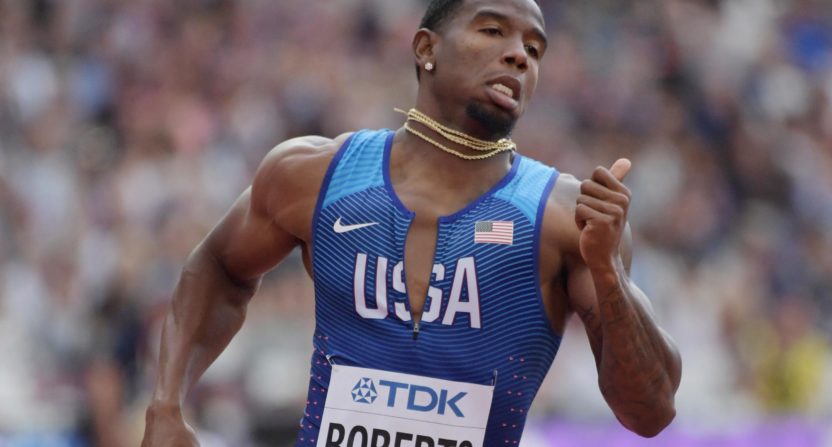Olympic gold and silver medalist Gil Roberts had an odd defense for a failed drug test, and incredibly, it worked.
The 4×400 men’s relay sprinter, who won gold in 2016 in Rio and silver in 2012 in London, appeared at the Court of Arbitration for Sport on Thursday in a banned substance case. Roberts was arguing that he didn’t intend for the banned drug, which caused his suspension last May, to enter his body.
What was his argument for how it entered his body without him knowing? Kissing, of course. His defense in court was that the drug entered his system “due to frequent and passionate kissing of his girlfriend.”
In July, an arbitrator upheld the sprinter’s kissing defense and reversed his original suspension. This led the World Anti-Doping Agency to appeal the decision and landed Roberts in the Court of Arbitration for Sport on Thursday. The arbitrators agreed with Roberts, disagreed with WADA, and vacated the suspension.
When asked about the specifics of the kiss, here is what Roberts told The New York Times:
“There could have been tongue kissing, but it was more that she kissed me so soon after taking the medicine,” Roberts said.
The drug in question was probenecid, which Roberts tested positive for in March of 2017. When Olympians are drug tested, the sample is divided into two different samples: Sample A and Sample B. If Sample A tests positive, Sample B is tested to confirm the validity of test A. In May, the United States Anti-Doping Agency said Sample B also tested positive for the banned drug, ultimately leading to Roberts’ suspension that same month.
This is what led Roberts and WADA down the kissing rabbit hole. Roberts’ girlfriend, Alex Salazar, got a sinus infection while in India in March of last year and was prescribed Moxylong, which contained the illegal substance. Roberts and Salazar were even able to trace back to the exact kiss that led to the positive test.
Salazar was diagnosed in March and later that month on March 24th, Salazar took the medicine in the afternoon and kissed Roberts shortly thereafter. Three hours after they kissed, the doping office arrived to take Roberts’ sample. Little did they know that kiss would be Roberts’ first line of defense in court to preserve his Olympic resume.
“Thus, for Roberts, it must have been like lightning out of a clear blue sky for him to learn that by kissing his girlfriend this time that he was exposing himself to a prohibited substance. Roberts has met his burden of proof,” USADA said in its ruling in July.
This isn’t the first time that kissing has been a winning defense in a doping case.
Another 2016 Rio Olympian also had to face questions for doping that came about from kissing. Canadian pole vaulter Shawn Barber tested positive for cocaine before the 2016 games thanks to a woman he met on Craigslist. It was ruled before the games that Barber had small amounts of cocaine in his system thanks to kissing the woman.
Back in 2009, tennis player Richard Gasquet was banned from the sport after he tested positive for cocaine. Ultimately, the International Tennis Federation’s tribunal panel struck down the ban after it decided Gasquet accidentally took cocaine by kissing a woman at a nightclub.
[ESPN]







